The Borderlands - The Science

Mary O'Connell, PhD, is the featured scientist in Ancient Roots, Modern Medicine. She is the founder and director of NMSU's Medicinal Plants of the Southwest (MPSW). She says, "The goal of the NIH funded project is to attract and train students with the ultimate hope that they will pursue PhD degrees in any number of disciplines that are constituted by medical research. These include Chemistry, Biology, Physiology, medicinal plants, natural products, microbiology, or bioengineering, just to name a few."
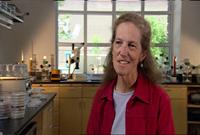
Mary O'Connell, PhD
Dr. O'Connell explains, "The program has special appeal for students from minority cultures. Many students in the Southwest come from cultures that use plants as medicines for improving quality of life issues and relieving minor aches and pains, cuts, or treatments of modest infections. So it's very, very reasonable to entice these students about how the chemistry in those plants could be studied to have an efficacy in a bio-medical context."
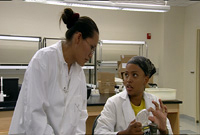
Students in the MPSW program
The students at NMSU generate a list of plants to study based on about 100 years of ethno-botanical research. Dr. O'Connell continues, "The basis of the hypothesis is that if you use plants as a source of drugs that have been identified by cultures as being important medical agents, you increase the odds of finding efficacious chemistries two to three fold, so the drug companies know this factor. Medical communities understand this so what we are hoping to show is that students will learn how drugs are developed by studying the whole process of chemical synthesis. Chemical extraction, analytical tools and then testing those chemistries for their efficacy."
Students Scientists in Training
The students spend hours learning precise lab procedures to be used on the plants. For example, they learn how to extract and purify the compounds, and how to identify their structure. They learn what kinds of solvents to use. They also design biological experiments that test for the ability of plant extracts to inhibit the growth of certain microorganisms in a controlled setting.
Dr. O'Connell says her goal in this program is not to discover new drugs. Instead, she wants to train scientists to go out and do this type of work later in their careers.
View video: Dr. O'Connell talking about Discovering New Drugs.
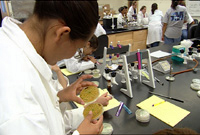
At work in the MPSW Laboratory
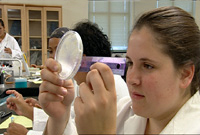
Students in the lab
Fred Hutchinson Cancer Center
Click here for more information about the Fred Hutchinson Cancer Center.
Dr. O'Connell has arranged an exciting collaboration with a cancer research center. Presently, some NMSU students are taking their plant extracts to the Fred Hutchinson Cancer Center in Seattle. At the Center, the young researchers work in Dr. Julian Simon's lab that specializes in drug discovery. Students can screen the compounds extracted from Southwestern plants (in the lab's anti-cancerous assays.)
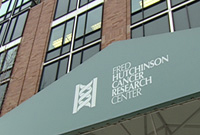
The Fred Hutchinson Cancer Center
Dr. Simon says, "Most of our anti-cancer drugs, or at least many of them, are derived from natural sources - plants and microorganisms. So over the millennium that evolution has worked on these sources, they have developed very sophisticated pathways to produce small molecules what we know as drugs. And that evolutionary process has yielded things that are very specific. What we are trying to do is to discover whether that specificity is useful in the treatment of cancer. There are over a hundred specific diseases that we call cancer. And those all have specific genetic fingerprints so the likelihood that any single drug will be active against the whole spectrum of tumors is small. What we are trying to do now is find specific medicines with specific genetic fingerprints to treat cancer."
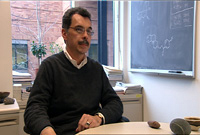
Dr. Julian Simon
View video: Dr. Simon discussing the Role of Natural Herbs in fighting cancer.
Dr. Simon says that developing a new drug can take anywhere from 5 to 10 years and cost hundreds of millions of dollars. Still, he sees reason for optimism. "There's always a chance that medicinal compounds will be found in the most unlikely of places." Who knows, maybe even from a plant found in the New Mexico desert!
For more information about this website.
Contact the webmaster to report any problems with this site.
New Mexico State University is an equal opportunity/affirmative action employer and educator. NMSU and the U.S. Department of Agriculture cooperating.